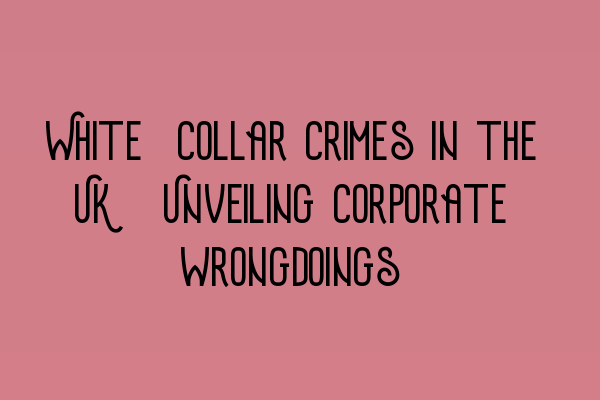White-Collar Crimes in the UK: Unveiling Corporate wrongdoings
In today’s business world, corporate wrongdoing has become a growing concern. Companies and individuals involved in white-collar crimes not only undermine the integrity of the corporate sector but also cause significant financial losses and damage to the economy. In this article, we will discuss some of the most common white-collar crimes in the UK and shed light on the consequences that offenders may face.
1. Fraud
Fraud is a serious white-collar crime that involves deceiving others for personal gain. This can include activities such as embezzlement, money laundering, tax evasion, insider trading, and false accounting. Fraudulent activities not only harm individuals and organizations but also erode public trust and confidence in the financial system.
To prepare for SQE 1 exams, it’s essential to familiarize yourself with various types of fraud and understand the legal implications. You can check out SQE 1 Practice Exam Questions and SQE 1 Practice Mocks FLK1 FLK2 to enhance your knowledge and test your understanding.
2. Bribery and Corruption
Bribery and corruption involve giving or receiving illegal gifts or inducements to gain an unfair advantage. These practices can seriously undermine the fairness and transparency of business transactions. The UK has strict laws to combat bribery and corruption, and offenders can face severe penalties, including imprisonment.
3. Money Laundering
Money laundering is the process of transforming illegally obtained funds into legitimate assets. This crime is often associated with other criminal activities, such as drug trafficking and organized crime. The UK recognizes the seriousness of money laundering and has implemented robust legislation to prevent and prosecute offenders.
4. Insider Trading
Insider trading involves trading stocks, securities, or other financial instruments based on non-public information. This unfair practice gives traders an unfair advantage and can manipulate market prices. The UK’s Financial Conduct Authority (FCA) closely monitors and regulates insider trading to maintain market integrity and protect investors.
5. False Accounting
False accounting refers to the deliberate manipulation or falsification of financial records. This white-collar crime can involve overstating revenues, understating expenses, or creating fictitious transactions. False accounting not only misleads investors and stakeholders but can also lead to significant financial losses for companies.
Conclusion
White-collar crimes can have far-reaching consequences for individuals, businesses, and the overall economy. It is crucial for legal professionals to understand the various types of corporate wrongdoings and the legal measures in place to combat them. By staying informed and continuously updating their knowledge, solicitors can effectively prosecute offenders and contribute to a fair and transparent business environment.
If you are preparing for the SQE 1 or SQE 2 exams, it’s important to have a strong understanding of criminal law and practice. Consider enrolling in SQE 2 Preparation Courses and SQE 1 Preparation Courses to enhance your knowledge and improve your chances of success. Stay up to date with the latest SRA SQE Exam Dates to plan your exam preparation effectively.
